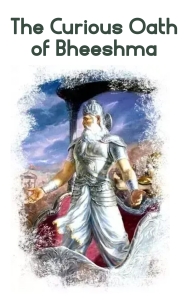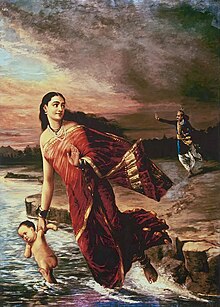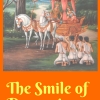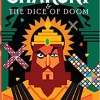
Pitamaha Bheeshma renounced his rights to the throne of Hastinapura to get his father Shantanu a new wife, Satyavati. Not only that, he even went to the extent of embracing lifelong celibacy, just to ensure kingship to Satyavati’s sons. For us, Bheeshma’s so-called magnanimity was but one of the greatest mysteries of the Mahabharata.
He did all these, ostensibly, to make his father happy! Keeping the father completely in the dark, the ‘righteous’ son went to such an unbelievable extreme. Such a fierce discharge of filial duty is simply unheard of. Only, he was so blindly besotted in narcissistic self-gratification that he did neither care to consider whether any good father could be made happy that way nor did he care to know from his father what he actually wanted. Perhaps it is the bitter time we are products of, or simply the unfortunate evolution of the human psyche towards cynicism over the years that disallows us to accept this act of Bheeshma as one of sheer magnanimity without a pinch of salt.
Did Bheeshma not realize that in his reckless pursuit of being a good son, he actually ended up making his father look like a libidinous pervert and dwarfed his father in front of a swaggering sacrifice? Shantanu was subjected to secret criticisms all over society for depriving his eldest son, and his image took a serious beating. He stood as an example of an unworthy father of a noble son. Was that what Bheeshma actually wanted? Was it actually an act of revenge on his father – at his own expense, nevertheless?
But why should he take revenge on his father?
 Bheeshma happened to be an incarnation of a Vasu – an elemental deity. There were eight such Vasus. One day, they had displeased the sage Vashishtha by their actions and incurred his wrath. Vashishtha cursed them to be born as human beings and spend one lifetime on the earth. These eight Vasus were born to Shantanu and Ganga one by one and Ganga used to kill them right after their birth, just to salvage them from the earthly life. But Shantanu protested one day and prevented her from killing the eighth child. Bheeshma was this eighth child. Due to Shantanu’s interference, the eighth Vasu could not be salvaged immediately and had to spend a very very long time on this earth. Did Bheeshma consciously or subconsciously bear his father a sinister grudge for not letting him return to divinity? Did the other Vasus curse Shantanu secretly?
Bheeshma happened to be an incarnation of a Vasu – an elemental deity. There were eight such Vasus. One day, they had displeased the sage Vashishtha by their actions and incurred his wrath. Vashishtha cursed them to be born as human beings and spend one lifetime on the earth. These eight Vasus were born to Shantanu and Ganga one by one and Ganga used to kill them right after their birth, just to salvage them from the earthly life. But Shantanu protested one day and prevented her from killing the eighth child. Bheeshma was this eighth child. Due to Shantanu’s interference, the eighth Vasu could not be salvaged immediately and had to spend a very very long time on this earth. Did Bheeshma consciously or subconsciously bear his father a sinister grudge for not letting him return to divinity? Did the other Vasus curse Shantanu secretly?
But Shantanu gave Bheeshma the boon of Icchhamrityu – Bheeshma could choose the time of his death. Then why did not Bheeshma choose death immediately after getting the boon to return to his divine form of a Vasu? Possibly, it was a cryptic message of Vyasadeva that one gradually falls in love with this mortal world, his divinity notwithstanding, and does not want to free himself from the magic of this world so easily. Even a forlorn man like Bheeshma, who had no kingdom to rule, no friends to trust, no woman to love, no children to carry his legacy wanted to live so desperately!
Can we suspect another possibility? Could it be the case that Bheeshma was medically unfit to father children and hence, could not be considered for the throne? Shantanu’s eldest brother Devapi had leprosy and had been ignored for kingship. Dhritarashtra, being blind, was sidelined and Pandu, his junior, became the king. There were many such instances inside the Kuru family itself. Had Bheeshma only renounced his rights and stopped there, probably we would not have doubted his greatness. But his oath of celibacy is too hard to digest, perhaps an output of our cynical times.
The Kauravas (the descendants of Kuru), who were a sub-clan of the ancient Puru dynasty, had a history of impotence falling upon different generations. Vichitraveerya, the son of Satyavati could not father any children in his married life with two wives spanning for more than seven years. After his untimely death, Vyasadeva, who happened to be another son of Satyavati from her previous alliance with rishi Parashar, had to be appointed to impregnate Vichitraveerya’s two wives Ambika and Ambalika to give birth to Dhritarashtra and Pandu. Pandu’s impotence was a well-known fact. Though Vyasadeva himself was very much virile, his own son Shukdeva was said to have attained the highest degree of savanthood and became absolutely immune to desire and lust; which could be construed as impotence. Dhritarashtra fathered more than a hundred children but many of his sons were childless. The Pandava brothers were not blissfully affected by impotency for the simple reason that they did not have any blood relation with Vyasadeva (as Pandu was not able to father them) or Satyavati, more specifically. The fact that Vichitraveerya, Pandu, Shukdeva, sons of Dhritarashtra – all had blood-relation with Satyavati gives a faint indication that she might have carried some streaks into the Kuru family which was responsible for causing sexual impairment in some men descending from her.
 Bheeshma was apparently not related to Satyavati. But actually, he was. Satyavati was not the daughter of a fisherman as believed. Satyavati’s biological father was a king named Vasu, famously known as “Uparichar” who happened to be a first cousin of Shantanu’s father Prateepa. Uparichar had abandoned Satyavati for some reason. Satyavati was actually Shantanu’s cousin, both having the same great-grandfather Kuru. The fisherman fostered her and she came to be known as his daughter. Satyavati was no stranger to the Kuruclan, rather she belonged to the Kuru house twice over – first by birth, then by marriage!
Bheeshma was apparently not related to Satyavati. But actually, he was. Satyavati was not the daughter of a fisherman as believed. Satyavati’s biological father was a king named Vasu, famously known as “Uparichar” who happened to be a first cousin of Shantanu’s father Prateepa. Uparichar had abandoned Satyavati for some reason. Satyavati was actually Shantanu’s cousin, both having the same great-grandfather Kuru. The fisherman fostered her and she came to be known as his daughter. Satyavati was no stranger to the Kuruclan, rather she belonged to the Kuru house twice over – first by birth, then by marriage!
Uparichar’s own line too had a troubled story. His own son, Brihadratha, also had serious difficulty fathering a child. One sage, namely Chandakaushik, apparently gave his queens a divine fruit to eat in order to bear a son. However, the two queens would give birth to two “half-babies” which were joined by Jara the monstress to create Jarasandha the great.
So, Satyavati should not be held responsible for bringing the vicious strain to the Kaurava house; rather she herself was a victim having acquired it from the same line of descent. The strain of impotency, possibly, had always been there in the Kuru lineage, though not as a dominant trait. Shishupal and Karna repeatedly cast aspersions at the vaunting legend of Bheeshma’s celibacy oath and hinted at his suspected impotency. However, considering their elementary spite against the venerable old man, we can discount their comments. Still, it may not be particularly outrageous to suspect Bheeshma’s virility, especially when his family had such a sad history of potency-related issues.
About the Author







Comments